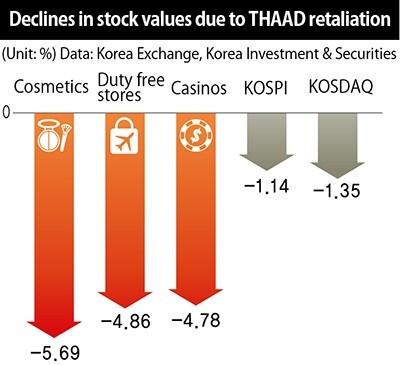hankyoreh
Links to other country sites 다른 나라 사이트 링크
China’s THAAD retaliation causing economic turmoil for South Korea

The South Korean economy is facing trials at home and abroad as China steps up its economic retaliation for Seoul’s Terminal High Altitude Area Defense (THAAD) deployment plan.
The THAAD tensions are creating a perfect storm, coming amid trade pressures with the US’s hints at reexamining its Free Trade Agreement with South Korea. Some of China’s measures are already having a visible impact, including the cancellation of large-scale South Korea visits by Chinese tour groups. Stock prices for duty-free stores and businesses involved in cosmetics, logistics, and aviation fell across the board on Mar. 3 as news broke of the Beijing’s halt on sales of South Korean tourism products, with Hotel Shilla and AmorePacific seeing respective drops of 13.1% and 12.7%. The won-to-dollar exchange rate climbed by 14.5 to 1,156.1. Analysts are attributing the numbers to the impact of China’s economic retaliation, combined with predictions of a US interest rate hike.
First proclaimed by the Chinese government for travel agencies in Beijing, the ban on South Korean travel product sales has reportedly spread throughout China. For some online travel agencies, South Korean travel programs are no longer searchable. In a notice on its website on Mar. 3, the China National Tourism Administration (CNTA) advised travelers to “choose [their] destinations carefully,” noting that Chinese nationals traveling on vacation to Jeju Island had been stuck at the airport for some time after being refused entry. The Incheon Tourism Organization announced the same day that the Chinese cosmetics company group Kouchen had notified it of the abrupt cancellation of plans to send 4,000 employees to Incheon on a reward trip on Apr. 17-21 - even after signing a provisional contract.
As the economic retaliation becomes increasingly overt, more and more observers are worrying about the impact spreading to other industries and businesses. China is South Korea’s single biggest trading partner, receiving 25.1% of its exports last year. Now there are growing fears that South Korean experts, which had been showing signs of recovery recently amid slumping domestic demand, could be once again hamstrung with China’s THAAD retaliation and the US’s intensifying protectionism.
Responding to reports of the travel product sales ban, the South Korean government said it first needed to investigate the facts.
“We’re reviewing the situation right now,” said the Ministry of Foreign Affairs.
“If the reports are accurate, then it is an unreasonable measure that artificially restricts even normal human interchanges that have nothing to do with the specific issue, which we find extremely dismaying,” it added.
A high-ranking source with the Ministry of Trade, Industry and Energy said, “In terms of national interests, we need to avoid a situation where things escalate into a head-on clash of tit-for-tat measures by the two governments.”
“Right now, things are not at the point where we could make a complaint with the World Trade Organization or view [the measures] as violation of the South Korea-China Free Trade Agreement,” the source said.
At a senior party-government meeting on Mar. 3, acting president and Prime Minister Hwang Kyo-ahn said, “Since intensifying objections from China are expected as the THAAD deployment moves closer to realization, we will continue monitoring China’s measures, bolstering our communication with China and establishing the necessary measures in a timely manner.”
Meanwhile, the South Korean embassy in China posted a notice on its website on Mar. 4 advising visitors of “an even greater need for caution with regard to our citizens’ safety in connection with recent developments related to the THAAD deployment, including the Lotte Group’s decision to provide a site.”
“We ask [travelers] to refrain as much as possible from traveling to densely populated areas and entertainment establishments,” the notice said.
By Kim Oi-hyun, Beijing correspondent, Cho Kye-wan and Kim Ji-eun, staff reporters
Please direct questions or comments to [english@hani.co.kr]

Editorial・opinion
![[Column] Season 2 of special prosecutor probe may be coming to Korea soon [Column] Season 2 of special prosecutor probe may be coming to Korea soon](https://flexible.img.hani.co.kr/flexible/normal/500/300/imgdb/original/2024/0426/3317141030699447.jpg) [Column] Season 2 of special prosecutor probe may be coming to Korea soon
[Column] Season 2 of special prosecutor probe may be coming to Korea soon![[Column] Park Geun-hye déjà vu in Yoon Suk-yeol [Column] Park Geun-hye déjà vu in Yoon Suk-yeol](https://flexible.img.hani.co.kr/flexible/normal/500/300/imgdb/original/2024/0424/651713945113788.jpg) [Column] Park Geun-hye déjà vu in Yoon Suk-yeol
[Column] Park Geun-hye déjà vu in Yoon Suk-yeol- [Editorial] New weight of N. Korea’s nuclear threats makes dialogue all the more urgent
- [Guest essay] The real reason Korea’s new right wants to dub Rhee a founding father
- [Column] ‘Choson’: Is it time we start referring to N. Korea in its own terms?
- [Editorial] Japan’s rewriting of history with Korea has gone too far
- [Column] The president’s questionable capacity for dialogue
- [Column] Are chaebol firms just pizza pies for families to divvy up as they please?
- [Column] Has Korea, too, crossed the Rubicon on China?
- [Correspondent’s column] In Japan’s alliance with US, echoes of its past alliances with UK
Most viewed articles
- 1Samsung subcontractor worker commits suicide from work stress
- 2‘We must say no’: Seoul defense chief on Korean, USFK involvement in hypothetical Taiwan crisis
- 3[Editorial] Korea’s surprise Q1 growth requires objective assessment, not blind fanfare
- 4No good, very bad game for Korea puts it out of Olympics for first time since 1988
- 5Division commander ordered troops to enter raging flood waters before Marine died, survivor says
- 6N. Korean delegation’s trip to Iran shows how Pyongyang is leveraging ties with Moscow
- 7Korea’s 1.3% growth in Q1 signals ‘textbook’ return to growth, says government
- 8US overtakes China as Korea’s top export market, prompting trade sanction jitters
- 9[Column] Park Geun-hye déjà vu in Yoon Suk-yeol
- 10[Column] Season 2 of special prosecutor probe may be coming to Korea soon